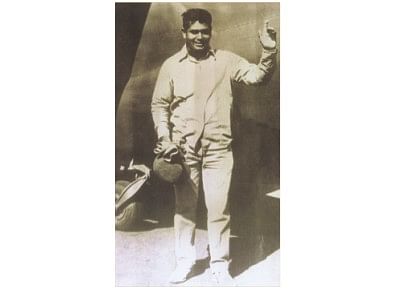<i>Of a mission impossible</i>

File Photo: Courtesy
"O boy! You have done it! I am so excited!"
These were the words of praise by an Indian air force officer for Bangladeshi pilot Shamsul Alam when he landed his aircraft after launching an almost impossible operation during the Liberation War in 1971.
Flt Lt Alam, who had escaped from Pakistan and joined the War, flew a dilapidated Otter from Kailashahor of India and destroyed an oil depot near Chittagong seaport on December 4 to stop fuel supply to the Pakistani occupation forces.
This was one of the successful and memorable attacks by a Bangladeshi pilot inside the then East Pakistan territory during the War.
The attack was launched minutes after midnight and Alam had to fly very close to the surface to evade Pakistani radar.
"There was no navigation system in the plane and I had to find out the target after counting time, maintaining direction and watching the surface features," Alam told The Daily Star.
The then Indian government gifted the Otter to Bangladeshi air fighters in October 1971. It was almost out of order but technicians made it flyable after repairing. They also fixed two pods under the craft for carrying rockets and created three holes for dropping bombs from inside, he added.
Alam in the mission titled "Operation Kilo" managed to fire all 24 rockets and bombs on target and two ships anchored at the port on his way to recovery.
"A strange feeling took over me when I saw flames following a bang after the rockets hit the target," said Alam who won the Bir Uttam title for this outstanding operation.
Machineguns started to scream from below, he went to say.
"It was our sheer good luck that we could eventually manage to escape,” said Shamsul who had flown with a co-pilot and a gunner. It was a battered aircraft that could have been shot down easily, at any moment.
"It was a serious blow to the confidence of Pakistani forces. They had become morally weak after the attack as it was done in midnight which was beyond their imagination," he said.
On the other side, landing of the plane on a small runway at Kurigram of Nagaland was not very easy without any signal system or light.
"I had to land seeing surface features and it was tough as the runway was on a place surrounded by plenty of trees," said the great war hero who had landed his aircraft after over an eight-hour flight around 5:00am.
"I am still taken by surprise whenever I recall memories of that mission with that Otter," he added.
Earlier, Alam served two-month imprisonment and faced indescribable torture by the Pakistani forces after he had escaped from Pakistan but was caught in Dhaka.
However, he had received an amnesty when he agreed to get back to Pakistan on August 14. But he again fled from his Malibagh house when he was on a seven-day leave.
Bangladeshi air fighters started conversion trainings on an abandoned airfield at Dhimapur in Nagaland with a Dakota (DC-3), an Otter and a chopper in October.
They chose dark nights in the hilly areas for training as they had planned to carry out their attacks in the dark.
Moreover, it was very much risky too to launch attacks on the occupational forces with the three aircraft in daylight.
Of the three aircraft, two were exploded after independence, while the Otter has landed at the museum of Bangladesh Air Force.
Alam was probably the first Bangladeshi air force officer who had landed that Otter at Tejgaon Airport in independent Bangladesh on December 17.

 For all latest news, follow The Daily Star's Google News channel.
For all latest news, follow The Daily Star's Google News channel. 



Comments